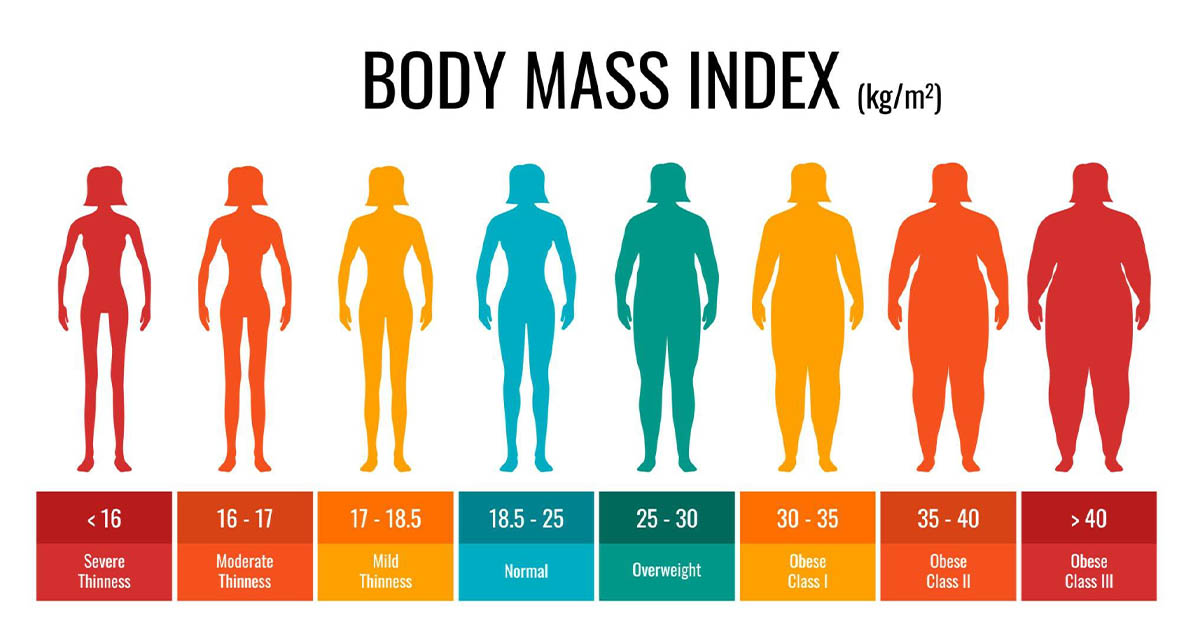BMI Asian Calculator
What is my BMI?
| BMI | Nutritional Status |
|---|---|
| Below 18.5 | Underweight |
| 18.5 – 24.9 | Normal Weight |
| 25.0 – 29.9 | Pre-obesity |
| 30.0 – 34.9 | Obesity Class I |
| 35 – 39.9 | Obesity Class II |
| Above 40 | Obesity Class III |
Why the BMI Asian Calculator Is Essential for Your Health and Fitness Goals
Maintaining a healthy weight is a fundamental aspect of achieving and sustaining fitness and well-being. In a landscape filled with countless diet plans and exercise routines, it’s often challenging to determine where to begin. Fortunately, the BMI Asian calculator emerges as a valuable tool to guide you on your health journey.
BMI, which stands for Body Mass Index, is a metric that assesses your body fat based on your weight and height. The use of a BMI Asian calculator allows you to discern whether you fall within the categories of underweight, overweight, or within a healthy weight range. This knowledge is indispensable for establishing achievable fitness objectives and tracking your progress over time.
In this guide, we’ll delve into the significance of the Asian BMI calculator for your health journey and explore how it can contribute to the accomplishment of your fitness aspirations. Whether you’re embarking on your fitness journey or aiming to elevate your exercise regimen, the BMI Asian calculator is a vital resource to aid your endeavors.
Understanding BMI and Its Significance

BMI, or Body Mass Index, serves as a yardstick for gauging body fat by taking into account an individual’s height and weight. Healthcare professionals commonly employ BMI to determine if someone is underweight, overweight, or maintaining a healthy weight. The formula to calculate BMI is straightforward: weight (in kilograms) divided by the square of height (in meters).
While BMI is not a perfect indicator of body fat, it proves useful in assessing overall health. Research has demonstrated that individuals with elevated BMIs are at an elevated risk of various health issues, including heart disease, diabetes, and specific types of cancer. Moreover, excess weight can adversely affect mental health, self-esteem, and overall quality of life.
Given these considerations, it is imperative to be aware of your BMI and take steps to manage a healthy weight. Whether your objective is weight loss, muscle gain, or maintaining your current weight, the BMI Asian calculator can be a pivotal tool to help you accomplish your health objectives.
Impact of BMI on Your Health
BMI serves as a vital indicator of overall health as it is closely correlated with a spectrum of health concerns. For instance, individuals with a BMI Asian calculator of 30 or higher are classified as obese, putting them at a heightened risk of heart disease, stroke, and type 2 diabetes. Even a modest increase in BMI can have adverse health consequences, such as elevated blood pressure and cholesterol levels.
Apart from physical health issues, being overweight or obese can also negatively impact mental well-being. Studies indicate that individuals with higher BMIs are more susceptible to depression, anxiety, and other psychological challenges. This can, in part, be attributed to societal stigma surrounding body size, resulting in feelings of shame, guilt, and diminished self-esteem.
By regularly monitoring your BMI and adopting measures to sustain a healthy weight, you can mitigate these health risks and enhance your overall quality of life.
Calculating Your BMI

Determining your BMI is straightforward and can be accomplished using a BMI Asian calculator. Numerous free BMI calculators are available online, typically requiring only your height and weight to generate a BMI score.
If you prefer to calculate your BMI manually, you can employ the following formula:
BMI = weight (kg) / height (m)²
For example, if you weigh 68 kg and are 1.75 meters tall, your BMI calculation would yield:
BMI = 68 / (1.75)² BMI = 22.2
Once you’ve computed your BMI, you can employ it to ascertain whether you fall within the categories of underweight, overweight, or a healthy weight.
Using a BMI Calculator for Weight Management
For those striving to shed excess weight, a BMI Asian calculator proves to be an invaluable asset. By consistently monitoring your BMI, you can track your progress and adapt your weight loss objectives as needed.
Suppose your current BMI places you in the overweight range. In that case, you may aspire to lose weight until your BMI aligns with the healthy range. Employing a BMI Asian calculator to track your advancement empowers you to gauge the amount of weight necessary to attain your objective and fine-tune your dietary and exercise regimen accordingly.
It is imperative to remember that rapid weight loss can be detrimental to your health. The recommended rate of weight loss is 1-2 pounds per week, which might not be immediately reflected in your BMI score. Nevertheless, by persistently monitoring your BMI, you can ensure you are losing weight at a healthy and sustainable pace.
BMI and Fitness Objectives
Beyond weight loss, a BMI Asian calculator also aids in setting and monitoring fitness goals. For instance, if your BMI falls within the healthy range, you may concentrate on building muscle and enhancing overall fitness.
By utilizing a BMI Asian calculator to monitor your progress, you can discern how changes in your weight and body composition affect your overall health. This enables you to make well-informed choices regarding your diet and exercise regimen and serves as motivation to stay on course with your fitness targets.
The Limitations of BMI
It is important to acknowledge that while BMI serves as a valuable tool for assessing overall health, it is not an infallible gauge of body fat. For instance, it does not account for variations in body composition, such as distinguishing between muscle mass and fat mass. Consequently, an individual with a substantial amount of muscle mass might possess a high BMI score, even though they are not overweight or obese.
Furthermore, BMI may not be an accurate health measure for specific demographic groups, including athletes or older adults. In such scenarios, alternative metrics of body composition, like waist circumference or skinfold thickness, might be more suitable.
Despite these limitations, BMI remains an essential tool for assessing overall health and tracking progress over time.
Alternative Metrics of Body Composition
While BMI is a valuable instrument for evaluating overall health, it is not the sole metric for assessing body composition. Depending on your objectives, other measurements may be more pertinent.
For instance, if you aim to increase muscle mass and enhance your fitness level, you may want to monitor your body fat percentage or muscle mass. These measurements can be acquired through various methods, including bioelectrical impedance analysis (BIA) or dual-energy x-ray absorptiometry (DEXA).
It is vital to recognize that these alternative metrics might not be as widely adopted or extensively researched as BMI and may not be covered by insurance. Nevertheless, if you seek a more personalized approach to tracking your progress, they merit consideration.
How to Utilize BMI to Craft a Healthy Lifestyle Plan
Once you have determined your BMI, you can employ it as a foundation to devise a tailored plan for attaining your health objectives. This strategy may encompass modifications to your diet and exercise routine, as well as other lifestyle adjustments conducive to improving your overall well-being.
For example, if you currently reside in the overweight or obese BMI range, you may concentrate on reducing your calorie intake while enhancing physical activity. By setting realistic objectives and monitoring your progress using Asian BMI calculator, you can stay motivated and remain on the path toward your weight loss goals.
In the event you already maintain a healthy weight, your focus may shift toward preserving that weight and augmenting your general fitness level. This might involve elevating your daily activity levels, such as incorporating regular walks or engaging in fitness classes.
BMI Asian Calculator and Medical Counsel
It is paramount to remember that BMI functions as one tool for assessing overall health and should not serve as a substitute for medical advice. If you harbor concerns about your health or possess specific health inquiries, it is imperative to engage with a healthcare professional.
In certain circumstances, your healthcare provider may advocate for supplementary tests or measures of body composition to assess your overall health. They may also be able to provide personalized advice on diet and exercise that can help you achieve your health goals.
Frequently Asked Questions About BMI
Why is BMI important?
BMI is important because it helps determine if a person is at a healthy weight, underweight, overweight, or obese. It is a useful tool for health professionals to assess the risk of certain health conditions related to weight, such as heart disease and diabetes.
How is BMI calculated?
BMI is calculated by dividing a person’s weight (in kilograms) by their height (in meters squared).
What are the categories for BMI?
BMI is categorized as follows:
- Underweight: BMI below 18.5
- Normal weight: BMI between 18.5 and 24.9
- Overweight: BMI between 25 and 29.9
- Obese: BMI of 30 or higher
How can I calculate my BMI?
You can use our BMI calculator, which can be found at the top of this page. Alternatively, you can calculate it yourself by dividing your weight in kilograms by your height in meters squared.
What should I do if my BMI is too high?
If your BMI is too high, it is important to speak with a health professional. They can help you create a plan to improve your diet, exercise habits, and overall health.
Conclusion
Maintaining a healthy weight is crucial for staying fit and healthy, and a BMI Asian calculator can be an incredibly useful tool on your health journey. By tracking your BMI over time, you can set realistic goals, monitor your progress, and make informed decisions about your diet and exercise routine.
While BMI is not a perfect measure of body fat, it is widely used by healthcare professionals to assess overall health and can be a helpful tool for setting and achieving health goals. Whether you’re just starting out on your fitness journey or you’re looking to take your workouts to the next level, a BMI Asian calculator is an essential tool that can help you get there.
